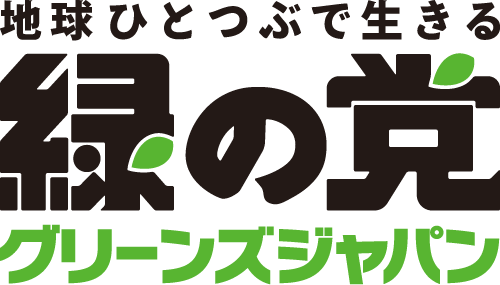【Statement】We strongly protest the decision to release contaminated water from Fukushima Daiichi Nuclear Power Plant
【Statement】We strongly protest the decision to release contaminated water from Fukushima Daiichi Nuclear Power Plant
April 18, 2021
Steering Committee of Greens Japan
(This statement is translated from April. 17, 2021 Statement (in Japanese)*1).
On April 13, the government decided at a ministerial meeting to release contaminated water from the Fukushima Daiichi Nuclear Power Plant into the Pacific ocean. We strongly oppose and protest this action.
It has been 10 years since the Fukushima nuclear reactor melt down caused by an earthquake which produced a tidal wave that destroyed the nuclear power station, Fukushima residents have been forced to live in a difficult life situation due to radioactive contamination of their land and environment. Many people have suffered from separation from their families between their homeland and the evacuated sites, others have been bullied living in unfamiliar cities. The suicide rate has grown extensible among people originating from Fukushima.
The contamination damaged not only the farming agriculture but also the fishing industry. Therefore, the fishermen of Fukushima were shocked by the government’s decision to release contaminated water into the ocean. Many local governments and councils in the Fukushima Prefecture stated their opposition a week prior to this decision (* 2) while leaders of the national and Fukushima Fisheries Federations met with Prime Minister Suga and expressed their strong opposition respectively.
The Japanese government and TEPCO (Tokyo Electric Power Company) have broken their promise with the fishermen and the community of Fukushima that they would not take any action without consensus of the parties concerned.
The contaminated water should not be called "treated water" or "tritium water" because it is still unsafe and contains many other radioactive particles than tritium. The government and media are trying to make it sound safe saying that "1,500 becquerels / liter is as low as 1/40 of the standard" and "this water is casually discharged even in normal operation of the nuclear power plants". Obviously they try to distort people’s concerns. Not only is it inaccurate, it is a deliberate distortion.
The water must be "1,500 becquerels / liter or less" as minimum obligation because it is hard to estimate the amount of added contamination by other nuclides than tritium. (* 3)
Furthermore, even TEPCO itself admits that the exposed fuel debris adds different nuclides in the water from the ones produced during the normal plant operation which cannot get rid of even after two treatments. Besides, there is a risk that the tritium particles stored for a long time in a tank may cause some chemical reactions of combining some organic substances and behaving in unknown ways different as ordinary tritium water would.
Those concerns should not be labeled as simple “bad rumors". The laziness of the authority can bring out a failure of reducing risks and an insultation of the concerning fishermen and residents.
In order to solve the problems of contaminated water, the Citizens’ Nuclear Committee suggest more feasible proposals. One is to store the water on land sites until nuclides become non-radioactive. Another is to switch the system of cooling damaged reactors from water cooling to air cooling not to increase the amount of contaminated water. (* 4)
TEPCO says that they don’t have enough land for storing contaminated water tanks. But we know they have the land prepared for containment of the debris in Fukushima Daiichi (First plant) and Daini (Second plant). TEPCO needs to wait for a significant time period before retrieving dangerous debris until the debris becomes half, quarter or even less radioactive, instead they should allocate the containment area for urgent use of storing the contaminated water.
TEPCO and the Japanese government are responsible to take those feasible measures in order not to contaminate the land and the ocean anymore.
They say the water is actually to be released in two years time. Until then, we, The Green Party of Japan, together with people inside and outside the Fukushima Prefecture, will continue demanding the government to withdraw their decision to release contaminated water into the ocean.
References
(*1) https://greens.gr.jp/seimei/30062/
(*2) Of the 59 local governments in Fukushima Prefecture, 42 local government councils submitted opposition (including caution) opinions.
(*3) See "1. Total amount of radioactive material unknown" in the FoE Japan statement "Protesting the decision to release treated contaminated water into the ocean" (https://www.foejapan.org/energy/fukushima/210413.html).
(*4) Statement of the Citizens’ Nuclear Committee "The government must not release ALPS-treated contaminated water from Fukushima Daiichi Nuclear Power Plant into the ocean. Contaminated water should be managed and disposed of responsibly on land for a long period of time." http://www.ccnejapan.com/wp-content/uploads/2020/10/20201020_CCNE.pdf


